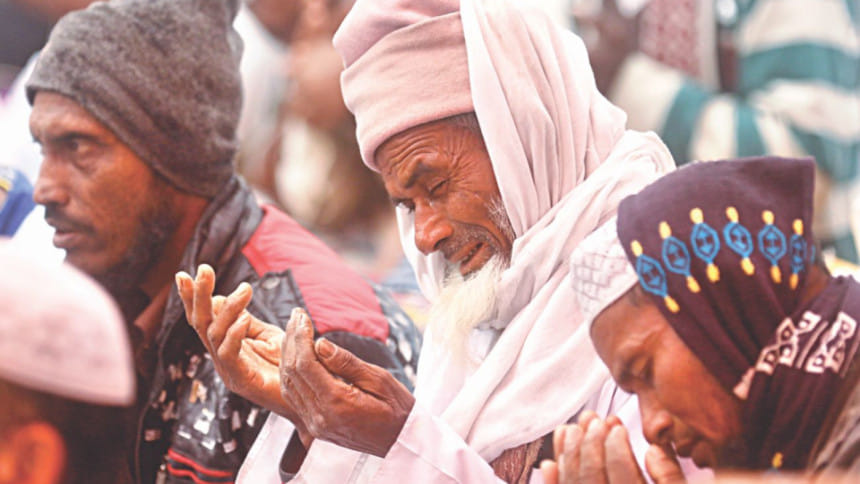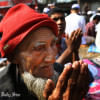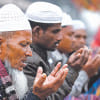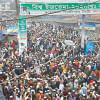Akheri Munajat offered in Bangla

Hundreds of thousands of Muslims raised their hands seeking divine blessings for mankind and forgiveness, as the first phase of the Biswa Ijtema concluded yesterday with the Akheri Munajat or final supplication conducted in Bangla on the Turag.
This is the first time the munajat was conducted in Bangla since 1980.
The Imam of Kakrail Mosque in the capital, Hafez Mohammad Zobayer, conducted the Munajat. In his 35-minute prayers beginning at 10:40am, Zobayer sought forgiveness and blessings for mankind and that they refrain from selfish acts and jealousy.
Zobayer had the opportunity to lead the prayers as Indian scholar and top leader of Tabligh Jamaat Mawlana Saad Kandhalvi, who conducted final supplications for the last three years (in Arabic and Urdu), could not join the congregation this year.
Tabligh Jamaat has been organising the Biswa Ijtema, also called the World Muslims' Congregation, every year since 1946. In 2011, the organisers split the congregation into two phases to deal with overcrowding, ensure better management and security.
The second phase of the 53rd edition of the Biswa Ijtema will begin on January 19 and conclude on January 21 with another Akheri Munajat.
Security was beefed up at the venue and surrounding areas ahead of the munajat.
THE PRAYERS
Mawlana Zobayer conducted the prayers in Bangla in addition to Arabic and Urdu. In previous years, Mawlana Zobayer had been translating sermons into Bangla for the devotees.
Mawlana Saad had been conducting the munajat since 2015 after the demise of Mawlana Zobayerul Hasan, another Indian Islamic scholar and top leader of Tabligh Jamaat. Mawlana Saad went back to New Delhi on Saturday in the face of protests by a section of Tabligh followers who claimed that he had made “controversial comments about the Quran, and Sunnah” to audiences in India.
Devotees started to throng the Ijtema venue from early morning. They walked, took trains and other means of transportations to reach the venue.
Sultan Uddin, a fruit vendor at Mirer Bazar of Gazipur, said he walked three kilometers to reach Tongi after Fazr prayers. Later, he took part in the munajat sitting on the road, he said.
Devotees, including foreigners, attended the Akheri Munajat braving the bitter cold. A serene silence dawned upon the congregation as the final prayers began, which was made available for all to hear through loudspeakers.
People living in the vicinity joined in. Some joined the prayers through via mobile phones and electronic media.
Tens of thousands of devotees also participated in the Munajat from nearby places, including Abdullahpur, Tongi Railway Station and Airport Railway Station.
Many were happy that the final prayer was delivered in Bangla this year.
Abdul Aziz, a resident of Manda, said he had taken part in the Akheri Munajat on a number of occasions “but this was the first time I could fully understand the meaning of the munajat”.
Shariful Islam, another devotee from Gazipur, said prayers in Bangla helped him understand the deeper meaning of forgiveness sought by Mawlana Zobayer.
Prime Minister Sheikh Hasina took part in the prayers with her family members and relatives from the Gono Bhaban.
Ministers, state ministers, Awami League leaders, and top officials of the Prime Ministers' Office and the Gono Bhaban also joined.
PRAYERS BEYOND TURAG
Tens of thousands of devotees joined the prayers from across the country. People took part in the final prayer on the Dhaka-Mymensingh highway from the terraces of their houses, footbridges, alleys and lanes, factories, markets, from their cars, and from boats on the Turag.
Thousands dropped whatever they were doing, and joined in from wherever they were.
Most educational institutions, factories and offices near the venue remained closed yesterday.

 For all latest news, follow The Daily Star's Google News channel.
For all latest news, follow The Daily Star's Google News channel. 








Comments